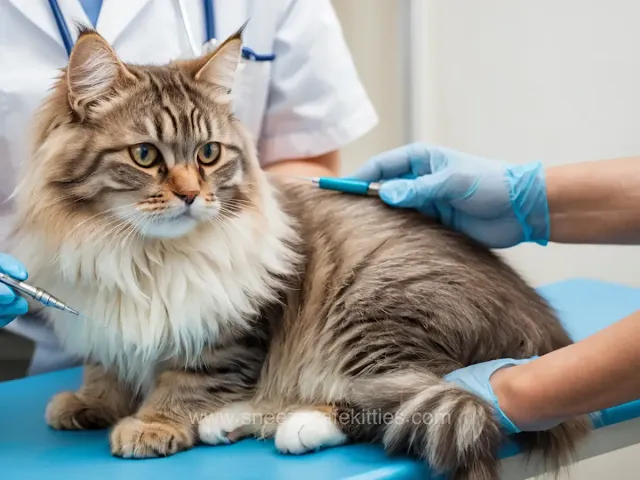The Importance of Vaccinations for Hypoallergenic Cats
 |
| Vaccinations for Hypoallergenic Cats |
Essential Vaccinations for Cats
Let's delve into the essential vaccinations that all cats, including hypoallergenic breeds, need to maintain optimal health.Core Vaccines
Core vaccines are considered vital for all cats, regardless of their breed or lifestyle. These vaccines protect against the most common and severe feline diseases:- Feline Panleukopenia (FPV)
- Feline Herpesvirus-1 (FHV-1)
- Feline Calicivirus (FCV)
- Rabies
Non-core Vaccines
Non-core vaccines are recommended based on a cat's individual risk factors, such as lifestyle and geographic location. These may include:- Feline Leukemia Virus (FeLV)
- Bordetella
- Chlamydophila felis
Vaccination Schedule
A typical vaccination schedule for cats might look like this:1. 6-8 weeks:
- Core Vaccines: FPV, FHV-1, FCV
- Non-core Vaccines: FeLV (if at risk)
- Core Vaccines: FPV, FHV-1, FCV
- Non-core Vaccines: FeLV (if at risk)
- Core Vaccines: FPV, FHV-1, FCV, Rabies
- Non-core Vaccines: FeLV (if at risk)
- Core Vaccines: FPV, FHV-1, FCV, Rabies booster
- Non-core Vaccines: FeLV (if at risk)
- Core Vaccines: FPV, FHV-1, FCV (every 3 years), Rabies (as required by law)
- Non-core Vaccines: As needed
Potential Side Effects
While vaccinations are generally safe, some cats may experience mild side effects:- Low-grade fever
- Decreased appetite
- Mild lethargy
- Localized swelling at the injection site
- Allergic reactions
- Injection site sarcomas (very rare)
- It's crucial to discuss any concerns about potential side effects with your veterinarian.
Specific Vaccination Needs for Hypoallergenic Cats
Let's explore the specific vaccination needs for hypoallergenic cats. While these felines are known for producing fewer allergens, their health requirements are just as important as those of other cats.Immune System Considerations
Hypoallergenic cats, like their non-hypoallergenic counterparts, require a robust immune system to ward off diseases. However, some breeds may have unique immune considerations:- Sphynx cats: Their lack of fur makes them more susceptible to skin infections
- Russian Blue: Known for having a sensitive digestive system
- Additional boosters for core vaccines
- Specialized skin treatments for hairless breeds
- Probiotics to support digestive health
Environmental Factors
The living environment of hypoallergenic cats plays a crucial role in determining their vaccination needs:- Indoor cats: May require fewer non-core vaccinations
- Outdoor access: Increased risk of exposure to diseases, necessitating a more comprehensive vaccination plan
- Multi-cat households: Higher risk of infectious diseases, potentially requiring more frequent boosters
Benefits of Vaccinating Hypoallergenic Cats
Vaccinating hypoallergenic cats offers numerous advantages that contribute to their overall well-being and longevity. Let's explore these benefits in detail:Disease Prevention
Vaccinations play a crucial role in protecting hypoallergenic cats from various potentially life-threatening diseases. By stimulating the immune system, vaccines help cats build resistance against common feline illnesses. Here's a list of diseases that can be prevented through proper vaccination:- Feline Panleukopenia (Distemper)
- Feline Calicivirus
- Feline Herpesvirus
- Rabies
- Feline Leukemia Virus (FeLV)
Reduced Allergic Reactions
While hypoallergenic cats produce fewer allergens, vaccinations can further reduce the likelihood of allergic reactions in humans. Here's how:- Improved Coat Health: Vaccinations help maintain a healthier coat, reducing dander and allergen production
- Stronger Immune System: A vaccinated cat is less likely to develop infections that could increase allergen production
- Reduced Stress: Healthier cats experience less stress, which can lower allergen production
Improved Overall Health
Vaccinations contribute significantly to a cat's overall health and well-being:- Enhanced immune function
- Reduced risk of chronic health issues
- Better response to environmental stressors
- Improved energy levels and vitality
Increased Lifespan
By protecting against deadly diseases and improving overall health, vaccinations can significantly extend a hypoallergenic cat's lifespan. Vaccinated cats are more likely to live longer, healthier lives, providing years of companionship to their owners.Addressing Concerns About Vaccination
When it comes to vaccinating hypoallergenic cats, some pet owners may have concerns. Let's address these common worries to help you make informed decisions about your feline friend's health.Vaccine Safety
The safety of vaccines is a top priority for veterinarians and pet owners alike. Here are some key points to consider:- Most vaccines undergo rigorous testing before approval
- Side effects are generally mild and short-lived
- Serious adverse reactions are rare
Cost Considerations
While vaccinations do come with a cost, they are a wise investment in your cat's health:- Prevention is cheaper than treatment
- Many clinics offer vaccination packages
- Pet insurance often covers vaccinations
Alternative Approaches
Some owners explore alternatives to traditional vaccinations. However, it's crucial to understand the limitations:- Homeopathic nosodes: Lack scientific evidence of effectiveness
- Titer testing: Can be useful but doesn't replace initial vaccinations
- Natural immunity: Risky and potentially life-threatening for cats
